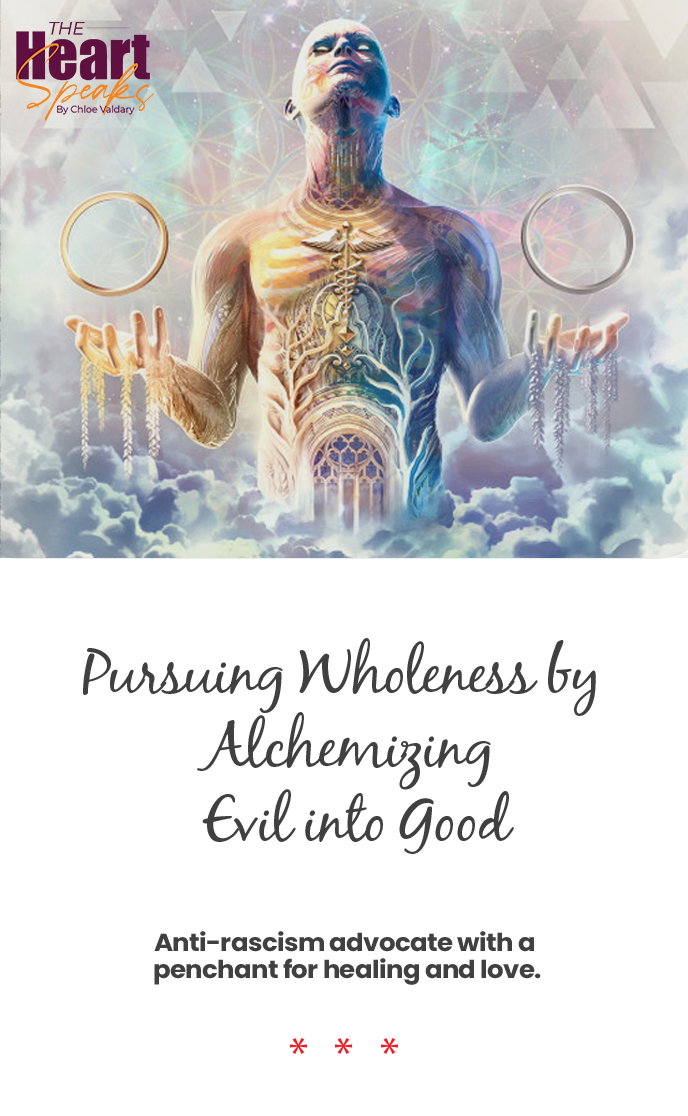Pursuing Wholeness by Alchemizing Evil into Good
At face value, the pursuit of the eradication of evil appears to be a noble and necessary cause. Evil, after all, is a destructive force, and a deadly one. However, any movement that seeks to completely eradicate evil will inevitably become evil. Why? Because evil cannot be completely eradicated. It can only be transmuted.
The very fabric of reality itself, operating as it does according to the laws of physics, prevents evil from being completely eradicated. Consider the principle of the conservation of energy which states that energy cannot be created or destroyed; it can only be transformed from one form to another. In a similar vein, all evil cannot be destroyed, but can only be transmuted, just as one cannot destroy darkness and would, in attempting to do so, destroy light, as light and darkness depend upon each other to exist.
This basic, essential fact, has been lost in a culture which, since its (institutional) Christian inception has been encouraging its civilians to strive for perfection. Striving for perfection, is, after all, just another way of describing our species’s attempt to eradicate evil. Consider the following mystical reading from Barbarah Hannah, a Jungian scholar and writer in the 20th century whose many books I have gobbled up over the past few years, and whose takes illustrate the folly of this pursuit of perfection
“…perfection is necessarily one-sided, it attempts to develop the light side of man exclusively, to dismiss the dark side as sin which must be resisted at all costs, whereas everything that exists consists of both light and dark…life is no longer satisfied with Western man’s one-sided traditional attempt to strive after perfection in all the Christian virtues, but is now demanding the recognition of certain thoughts which definitely come from the other, the dark side of man.…The impossibility of fulfilling the Christian ideal led and leads increasingly to dangerous feelings of inferiority and neurosis. Indeed, St. Paul himself complained of this weakness in the Christian program: “For the good that I would, I do not; but the evil which I would not, that I do” (Romans 6:19) How much more problematic this has become in our complicated, over- populated, modern world where the dark side of man seems to be flourishing as never before! Jung became more and more convinced that a satisfactory solution to the contradictions inherent in this one-sidedness could only be found by giving up the hopeless search for perfection and replacing it with a quest for wholeness [emphasis: mine].
It is wholeness, not perfection that we must learn to shift towards in our strivings. And wholeness can only be achieved through the adoption of an integrative, dynamic ecology of practices that presupposes the dual, inter-dependent nature of darkness and light, and which does so in community.
There is much more to say about this and I’ll be exploring this topic in future entries soon so be sure to subscribe.
For A Deeper Dive:
Small Bite: Carl Jung and The Shadow
Big Bite: Striving Towards Wholeness by Barbara Hannah
Up Next: Chapter 2 - Hatred/Oppression: One Hell of a Drug
Hi Friends, I’d be so grateful if you’d consider becoming a patron of this substack. The more it grows, the more high (and higher, hehe) production musings I can create on topics like Life and Death, Religion vs Spirituality, The Wisdom in Pop Culture, and more. My ultimate goal is to help seed communities of practitioners committed to living the examined life. I really believe this is what we need at this time, especially considering the levels of depression, stress, polarization and mental health epidemics we as a society find ourselves in. I aim for this substack and all content production to be an investment in that goal and, eventually, a library that communities of practice can leaf through. If this project moves you, please consider becoming a monthly supporter!



Sad that so few people are aware of Jesus' words in Aramaic. Or even such scriptures as the Gospels of John, Thomas and Mary Magdalene. At least some of the best-known scriptures have been translated by Neil Douglas-Klotz. The scripture "be you perfect as your heavenly father is perfect" is not how even most contemporary spiritual teachers interpret it, but many people still think it's about perfection.
This feels so important to me. As far as I can tell tell we tend to repress and then project our dark sides onto others, which makes it impossible to empathize with others because they now hold all the bad and we hold all the good. At the same time, each individual person knows that they aren't perfect, so we spent time trying to hide our dark sides from our self and from others. The energy we might use to grow and connect is spent hiding and blaming. In thinking about how we aim at wholeness, I think of Kristen Neff and her research on self-compassion. She claims that self-compassionate people-people who forgive themselves and show themselves empathy- are better able to recover and grow and less likely to burn out as caregivers.